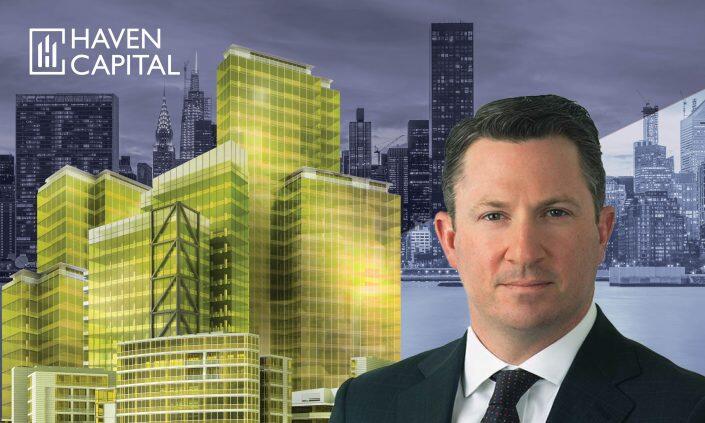
Pictured: Joe Shanley, Head of Acquisitions
Today’s rising interest rates may have led to some uncertainty in the financial landscape, but they were not entirely unexpected. In advance of the latest Federal Reserve meeting, many anticipated the Fed to raise rates by as much as a full percentage point in order to address current inflation. Interest rates were ultimately moved up by .75 percent, with Fed Chair Jerome Powell citing concerns that the current inflation rate of 8.5 percent may result in businesses and workers raising their prices and wages in anticipation of further inflation. This rationale means that the country can expect more federal fund rate increases this year, barring any significant changes to the economy.
Finding Another Way
For the real estate industry, this translates into a race for the best possible rates, which may mean turning to less traditional sources of financing. Last year, The Real Deal spoke with Haven Capital’s head of acquisitions, Joe Shanley, to learn more about why ground leases are quickly becoming a go-to source of capital; today, our team caught back up with him to find out where this strategy stands in the post-pandemic landscape.
“The historically low cap rate environment over the past few years has made it particularly difficult for multifamily and office investors to generate positive leverage,” Shanley explained. “And rising interest rates have added to the challenge. If you’re looking at traditional financing, there’s a very good chance that the debt you used 12 months ago is 150-200 basis points higher now. People are continuing to look to Haven as a solution, as we’re providing the lowest cost of capital currently available.”
A Response to High Demand
Haven Capital, formed in 2020 as a joint venture between private equity firm Regis Group and funds managed by Ares Management Corp., specializes in the origination of ground leases for high-quality assets across the country. The firm is led by Shanley, formerly of SL Green, who has played a key role in helping General Partners (GPs), investors and other real estate players understand the unique value that ground leases offer, particularly during periods of volatility, as we experienced over the past two years.
The demand for this product from multifamily investors remains strong, says Shanley. If someone goes to Freddie Mac for a loan today, they may only be able to get 50 percent LTV financing because they’re DSCR constrained as a result of higher rates. The alternative is to sell their fee to me at 40 percent, giving them higher leverage (when combined with a leasehold loan) at a lower total cost.
The scenario Shanley describes is unlikely to resolve anytime soon. According to Fannie Mae, multifamily cap rates showed minimal signs of expansion despite rising interest rates, holding at 4.7% percent in the first half of 2022. In addition, MBA predicts multifamily lending in 2022 will be 10% lower than the previous year’s record, meaning less capital will be available for sponsors in the second half of the year. While some GPs and investors are waiting for the market to level out, those hoping to strike before the iron gets hotter are realizing that working with Haven to secure a ground lease is an extremely attractive option.
A Modern Take and Personal Approach
In short, a ground lease offers investors access to long-term, low-cost debt. Investors can lock in what are still historically low rates today, and the 99-year duration of the ground lease removes refinancing risk from the future. Haven Capital is at the forefront of proving how a bifurcation strategy can serve as an accretive funding source, putting the lowest-yielding land to work. Amidst a market that is rapidly coming to terms with how beneficial this is, Shanley says that the key to Haven’s success has been cultivating relationships:
“We spend a significant amount of time personally establishing ourselves within the market. With recent key hires, our team is now able to cover more ground, which is helping us to grow rapidly. Today, our average deal is somewhere between $100-150 million in total capitalization, and our clients range from large office investors with mega funds to individual owner/operators and developers. When sponsors compare their total capital stack and cost of debt with a ground lease against what they’re able to achieve through traditional sources, they see that we are by far the superior option.”
A Solution That Spans Markets
While Haven focuses primarily on multifamily, their strategy applies across other asset classes as well. For example, the debt market for office assets has recently become thinner, making the sector more difficult to participate in. But Haven’s team is still deploying capital in the space, allowing investors to realize value.
According to Shanley, “In the past, borrowers tended to avoid ground leases because they lacked predictability and were often detrimental to the value of the leasehold. Today, the roles have been reversed; ground lease capital can act as stable and predictable debt even as volatility in the debt market grows.”
It appears as though interest rates will continue along their current trajectory, and today’s GPs and investors must be prepared. As these owners continue to search for more attractive alternative sources of capital, the modern ground lease is likely the answer for many.
Haven Capital has positioned itself at the center of this industry transformation, and in the face of a landscape that is continuing to evolve, Haven’s team stands at the ready to provide solutions at jshanley@havengl.com


